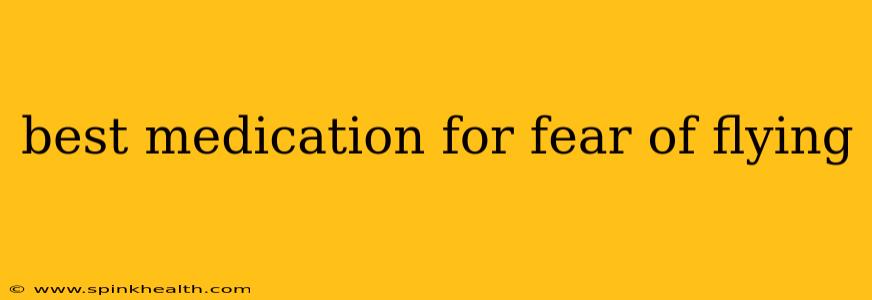Conquering Your Fear of Flying: Finding the Right Medication and Support
For many, the thought of soaring through the skies evokes excitement and adventure. But for others, the mere idea of flying ignites a deep-seated fear—aviophobia, or the fear of flying. This isn't just a mild discomfort; it's a debilitating anxiety that can significantly impact a person's life, preventing travel and causing considerable distress. If you're grappling with this fear, know that you're not alone, and there are ways to manage it, including exploring medication options. But let's be clear: medication isn't a magic bullet; it's often most effective when combined with other therapeutic approaches.
This journey to overcome your fear isn't a sprint, it's a marathon. Let's explore the options, address common questions, and pave the way for a more confident and comfortable you.
What is the best medication for fear of flying?
There isn't a single "best" medication for aviophobia, as the ideal choice depends heavily on individual factors like your overall health, the severity of your anxiety, and your response to different medications. A psychiatrist or therapist specializing in anxiety disorders is the best resource to determine the right course of action for you. However, certain medication classes are often considered:
-
Anxiolytics (Anti-anxiety Medications): These medications are primarily used to reduce anxiety and panic symptoms. Benzodiazepines, such as alprazolam (Xanax) or lorazepam (Ativan), are sometimes prescribed for short-term use before a flight to manage acute anxiety. However, they can be habit-forming and have potential side effects, so they're typically not a long-term solution. Other, non-benzodiazepine anxiolytics, such as buspirone (Buspar), may be considered for longer-term anxiety management but are less effective for immediate pre-flight anxiety.
-
Beta-Blockers: Primarily used to treat high blood pressure, beta-blockers can also help manage some physical symptoms of anxiety, such as rapid heartbeat and trembling. They don't address the underlying anxiety, but they can make the experience more tolerable. Propranolol is a commonly used beta-blocker for this purpose.
-
Selective Serotonin Reuptake Inhibitors (SSRIs): These antidepressants, such as sertraline (Zoloft) or paroxetine (Paxil), are often prescribed for long-term management of anxiety disorders, including generalized anxiety disorder (GAD) which often accompanies aviophobia. They take time to become fully effective (several weeks), so they are not suitable for immediate pre-flight anxiety relief, but they can be highly beneficial in reducing overall anxiety levels over time.
Are there any natural remedies for fear of flying?
Yes, many people find that combining medication with natural remedies or therapeutic approaches can be highly beneficial. These include:
-
Cognitive Behavioral Therapy (CBT): CBT helps identify and challenge negative thoughts and beliefs about flying, replacing them with more realistic and positive ones. It's a highly effective long-term strategy.
-
Exposure Therapy: Gradually exposing yourself to flying-related stimuli, starting with less anxiety-provoking situations and progressing to more challenging ones, can help desensitize you to your fear.
-
Relaxation Techniques: Deep breathing exercises, meditation, and mindfulness practices can help manage anxiety symptoms.
-
Herbal Remedies: While not scientifically proven to be as effective as medication, some people find relief from herbal remedies like chamomile tea or valerian root. Always discuss these with your doctor before incorporating them into your treatment plan.
How long does it take for medication to work for fear of flying?
The effectiveness and timeframe vary greatly depending on the medication and the individual. For immediate pre-flight anxiety relief, benzodiazepines can take effect within 30-60 minutes. SSRIs, on the other hand, require several weeks of consistent use to show significant improvements in anxiety levels. Beta-blockers can provide relatively quick relief from physical anxiety symptoms.
What are the side effects of medication for fear of flying?
Side effects vary depending on the medication. Benzodiazepines can cause drowsiness, dizziness, and impaired coordination. SSRIs can cause nausea, insomnia, and weight changes. Beta-blockers may lead to fatigue, low blood pressure, and bradycardia (slow heart rate). It's crucial to discuss potential side effects with your doctor before starting any medication.
What should I do if medication isn't helping?
If you're not finding relief from medication alone, don't hesitate to reach out to your doctor or therapist. They can adjust your medication, recommend additional therapies like CBT or exposure therapy, or refer you to a specialist. Remember that overcoming aviophobia is a journey that often requires a multi-faceted approach. Persistence and a supportive treatment team are key to success. Never give up hope—flying freely is attainable.

